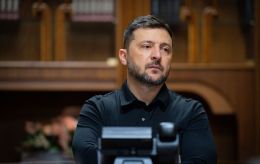South Korea's President apologises for martial law, but refuses to resign
 Photo: South Korean President Yoon Suk Yeol (Getty Images)
Photo: South Korean President Yoon Suk Yeol (Getty Images)
South Korean President Yoon Suk Yeol apologized for his attempt to impose martial law this week. However, he did not resign, despite mounting pressure, including from some members of his ruling party, reports Reuters.
The president stated that he would not seek to avoid legal and political responsibility for his decision to declare martial law, the first in South Korea since 1980. He said his decision was driven by desperation.
"I am very sorry and would like to sincerely apologize to the people who were shocked. I leave it up to my party to take steps to stabilize the political situation in the future, including the issue of my term in office," Yoon said in a televised address to the nation, during which he bowed.
Han Dong-hoon, leader of the ruling People Power Party, said after the speech that the president could no longer fulfill his duties, and his resignation was now inevitable.
Some members of the People Power Party called for Yoon’s resignation before a vote. They stated they did not want a repeat of the 2016 impeachment of President Park Geun-hye, who stepped down after months of candlelight protests over a corruption scandal. Her downfall led to the disintegration of her party and the victory of liberals in presidential and general elections.
In scenes reminiscent of those protests, thousands of demonstrators with candles gathered outside the parliament on Friday evening, demanding Yoon's impeachment. New rallies are expected to take place before Saturday’s vote.
The prosecution, police, and the Corruption Investigation Office for High-ranking Officials have launched investigations into Yoon and other officials involved in the martial law decree. They may face charges of sedition and abuse of power.
Martial law in South Korea
On the evening of December 3, President Yoon Suk Yeol declared martial law in South Korea. He accused the opposition Democratic Party of engaging in anti-state activities and maintaining ties with North Korea, as well as attempting to defeat other political opponents.
The decision triggered a serious political crisis, with dozens of officials resigning in protest. Mass demonstrations by residents opposed to the decision began near the parliament in Seoul.
On December 4, the South Korean parliament and government passed resolutions calling for the immediate repeal of martial law.
Six hours after declaring martial law, Yoon canceled the special regime.
On Friday, Han Dong-hoon, leader of the ruling People Power Party, stated that President Yoon posed a danger to the country and should be removed from power. This statement came even though party members officially opposed the impeachment of the president.
Later, on Saturday, December 7, the South Korean parliament will discuss impeachment proceedings against the president.

